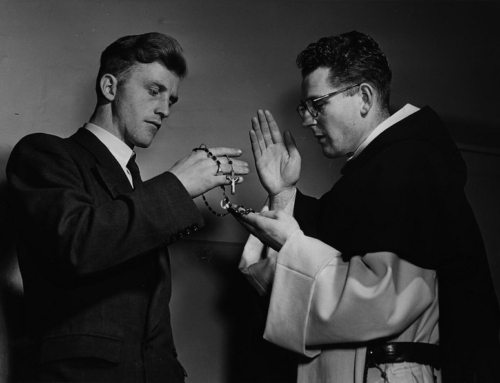Peter Kreeft, Practical Theology: Spiritual Direction from Saint Thomas Aquinas. San Francisco: Ignatius, 2014.
Sometimes I will pick up a volume of Thomas Aquinas’ Summa Theologiae and scroll through the pages at random. I will flip past objection after objection, response after response, each of them nestled within articles within questions within treatises within volumes. Bold-faced queries flash by like Whether the angels exercise functions of life in the bodies assumed? or Whether the prohibitive precepts relating to the vices opposed to prudence are fittingly propounded in the Old Law? And then sometimes the thought will occur to me: This is totally nuts.
But then I will remember all the wisdom which belies that drab surface of meticulously arranged theological data.
Nonetheless, that initial reaction is indeed many a person’s ultimate experience of the Summa. The question arises in such skeptics: what does all this have to do with real life?
Peter Kreeft seeks to address this question in his new work Practical Theology: Spiritual Direction from Saint Thomas Aquinas. In the introduction, he explains his own experience of reading Thomas’ work: “In a lifetime of browsing through Aquinas, my amazement has continually increased not only at his theoretical, philosophical brilliance and sanity but equally at his personal, practical wisdom, his ‘existential bite’” (xi). Indeed, if someone experiences Aquinas’ masterwork as a detached labyrinth of abstract questions, it is quite likely that they are missing something.
And indeed, Aquinas’ aim in writing the Summa was immensely practical. At its core, the Summa was and still is a training book for any who aspire to receive and to pass-on the splendor of Christian faith to real, concrete people.
In his work, Kreeft takes a multitude of passages from the Summa—358, to be exact—and helps his reader to see how the various truths illumine one’s daily experience of the world and beckon to a holier life. He continually reveals the necessary connection between intellect and will, between thinking and doing. As he explains, “Truth is our ultimate standard for all practice. That is why St. Thomas is so practical” (23).
The passages that Kreeft highlights are a tour across the whole Summa landscape—from the immanent life of God through the world of creation, into the virtues and vices, and on through Christ and the sacraments. As with the Summa, therefore, to read through Practical Theology is to embark on a journey across the wide world of the Christian life.
On this journey, you have two guides: one who speaks in a wise, old, and lofty voice, and a second who sounds a good deal more ordinary and lively and who serves as something of a translator.
The first one (Aquinas) says things like, “Goodness is rightly divided into the virtuous, the useful, and the pleasant.” And the second one (Kreeft) will later comment, “So if a thing is not virtuous, useful, or pleasant, it’s not really good…If the answer to all three questions is no, then dump it! A house without a garbage can becomes cluttered and smelly” (11). Or, the first will say, “All created perfections are in God. Hence He is spoken of as universally perfect, because He lacks not any excellence which may be found in creatures.” And again, the second will later add, “Every finite perfection we love and seek in the creation is to be found in an infinitely perfect form in God. What are we seeking in human love, in nature, in creativity, in thought? It’s desirable only because it’s a little like God” (8-9).
In his introduction, Kreeft compares this work to midrash, the practice of Jewish homiletic expoundings upon the Law, wherein one applies an abstruse subject to daily life. And that is indeed what Practical Theology is like. Time and again, Kreeft picks up a difficult theological topic and sums it up in a compact sentence. Primacy of grace in a free creature? Basically, “Grace does not turn off, but turns on, nature, and therefore our nature, and therefore our souls, and therefore our souls’ wills, and therefore their freedom” (43). Essence/existence distinction? In short, “The ‘essence’ of a thing is its nature, what it is; its existence is whether it is. Unicorns have an essence but no existence; horses have both; square circles have neither” (7).
My final note goes without saying, but I cannot help but mention it anyway: Kreeft, while not himself a Dominican, is nevertheless living the Dominican dream. A Dominican lives to receive the wisdom of the Faith and to speak it to others in such a way that they can receive it. In Practical Theology, Kreeft is doing exactly that—and he does so by way of a treasure of the Dominican tradition, no less. This work is, therefore, both an invitation to Christians to be good Christians and to Dominicans to be good Dominicans.
To download a printable PDF of this Article from
Dominicana Journal, Summer 2015, Vol LVIII, No. 1, CLICK HERE.




